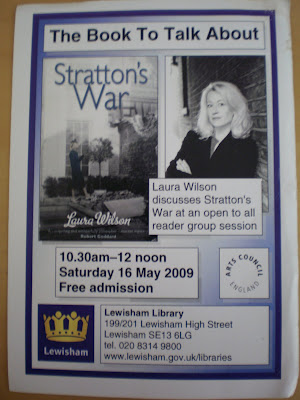
We went to Greenwich Park yesterday afternoon. I've never seen it so crowded. If it's like this in May, I don't know what will happen in the Summer - standing room only, perhaps.
 It's not just locals. either. At the top of the park, near General Wolfe's statue, foreigner visitors, including Japanese and a number from Eastern Europe, going by their accents, were vying for space to photograph one another astride the meridian line.
It's not just locals. either. At the top of the park, near General Wolfe's statue, foreigner visitors, including Japanese and a number from Eastern Europe, going by their accents, were vying for space to photograph one another astride the meridian line.It must be the weak pound that's drawing them in. Maybe the fact that Greenwich is now a World Heritage Site (like the Taj Mahal) is having an impact. The lower grassy area resembled Blackpool beach, with so many half-clad sunbathers.
I'm grateful to live within walking distance of such an attractive green space - not so big as the one at Richmond , where I also lived nearby for a year, and which had beautiful herds of deer wandering about, but the wonderful buildings at Greenwich more than make up for that. The Greenwich deer are behind a fence at the top of the park.
After The Tower of London and Buckingham Palace Greenwich is the biggest London tourist draw - at least it was in the run up to the Millennium, when I used to give talks to Travel and Tourism students about the Dome and the effect the area. Benefits included new transport connections and the reclaiming of the heavily polluted Greenwich Peninsula. I attended council meetings to follow the progress of the conntroversial project. As a result, I became a enthusiast. for the project. The Dome cost about £8 mill. to build, entirely funded by National Lottery money, ie public
 donations. At the time Lottery Money wasn't allowed to be used for hospitals, etc, so all the objections weren't really relevant.
donations. At the time Lottery Money wasn't allowed to be used for hospitals, etc, so all the objections weren't really relevant.I'm glad to see it's fulfilling forecasts made at the time of construction - that it would be a lasting legacy as the world's biggest concert venue.
It's annoying that the public don't get any of the profit, as it was sold off to a commercial company. I hope some of the revenue from what's now the '02 Arena' goes into the common purse.
Still, the park is free for everybody to enjoy - although I think it'll be Autumn before it regains its charm as a quiet green space.
Greenwich Park: http://www.royalparks.org.uk/parks/greenwich_park/
The O2 Arena: http://www.theo2.co.uk/
Maritime Greenwich: http://www.greenwichwhs.org.uk/
































